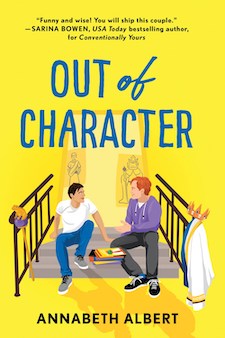Fairy tale adaptations are always popular with romance readers, but Charis Michaels’ new historical romance series has a particularly clever twist. While each Awakened by a Kiss book is inspired by a classic story, the characters are based on supporting characters such as Snow White’s huntsman and Cinderella’s stepsisters. Isobel Tinker, the spunky, take-no-prisoners heroine of Michaels’ latest romance, When You Wish Upon a Duke, is (of course) inspired by Tinkerbell.
If you’re in search of more enchantment after reading Michaels’ latest love story, here are five more fairy tale-inspired romances with the author’s stamp of approval.
Little known-fact: I used to work at Disney World. And not as a disgruntled teenager or Orlando local. I actively pursued a job at the Most Magical Place during my junior year in college. I forsook serious internships to drive four states away and join the Disney “cast.” Wearing a Mickey name badge and black leather Reeboks, I pointed tourists in the direction of Space Mountain. The experience did not disappoint; I left Florida at the end of the summer in a happy swirl of chlorine and pixie dust.
Perhaps the natural next step was to write historical romance. Romances are, in many ways, fairy tales for adults. My current series, Awakened by a Kiss, is dripping in pixie dust. The trilogy explores “whatever-happened-to” sideline characters from classic tales like Snow White, Cinderella and Peter Pan. The first book, A Duchess a Day, follows up on the Huntsman from Snow White. The third book, If the Duke Fits, will give the happily-ever-after treatment to a stepsister from Cinderella. But perhaps the book I’m most excited about is my current release, When You Wish Upon a Duke.
The heroine, Miss Isobel Tinker, is inspired by Tinkerbell from Peter Pan. After a chaotic youth spent cavorting around Europe, Miss Tinker has sworn off two things: travel and men. She works as a clerk in a travel agency and vows never to leave her safe, reliable life in London. (Best-laid plans.) When a dashing duke strides into the shop and makes an offer she cannot refuse, Miss Tinker is compelled to dredge up her latent language skills and serve as his translator. Hilarity, adventure and passion ensue, with pirates and geothermal pools and that oh-so-important happily ever after.
Fairy tale themes in popular fiction have enriched and captivated readers for decades. To help celebrate the release of When You Wish Upon a Duke, I give you five novels that take inspiration from the words, “Once upon a time . . .”

The Beast of Beswick by Amelia Howard
If you love a beastly aristocrat in need of redemption, look no further than this "Beauty and the Beast"-inspired Regency.

This contemporary romance combines Moyes’ beautiful writing with the timeless tale of a maid who falls in love with a prince of a rich guy.

The Devil’s Own Duke by Lenora Bell
Another Cinderella story, this is a reverse fairy tale. The hero is a working-class Cinderella and he comes up from the streets to marry a duke’s daughter. (This one’s not out until September 28, so preorder it now!)

Out of Character by Annabeth Albert
While not inspired by a specific fairy tale, this contemporary romance features a prince and frog wizard (in costume!). Friends-to-lovers takes center stage here, with a magical backdrop of cosplay and fantasy gaming.

Once Upon a Tower by Eloisa James
Few authors revisit a fairy tale like Eloisa James. Her Fairy Tales series spans multiple books, each one more magical than the next. My favorite is the Rapunzel-inspired Once Upon a Tower. The magic begins with the gorgeous cover and the story inside carries you away.










 Isabel Cooper
Isabel Cooper Elizabeth Kingston
Elizabeth Kingston Jeannie Lin
Jeannie Lin


 Amanda Quick
Amanda Quick





















